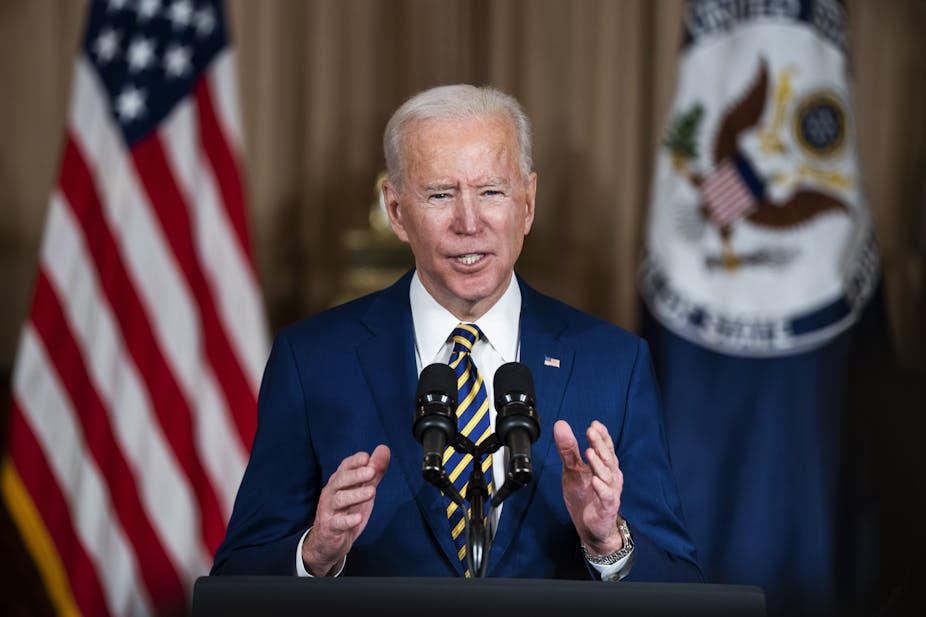President Joe Biden delivered his first public statement on US foreign policy last week. Africa was not mentioned. Does this suggest the continent will be absent from the new administration’s considerations?
I think not.
Firstly, the day after his speech, the new president addressed the 34th Summit of the African Union (AU), which was meeting virtually due to the COVID-19 pandemic. He reiterated his commitments to active diplomacy and multilateralism in concert with the AU.
All US efforts would be consistent with America’s core democratic values, which are also enshrined in the AU’s Constitutive Act and the African Charter on Democracy, Elections and Governance. They have recently been assaulted in Uganda and Ethiopia. But at least a broad US-Africa consensus to cooperate in preventing and resolving problems may be emerging.
And within days of becoming president Biden issued an executive order voiding Trump’s 2017 policy banning all recipients of US government assistance from mentioning abortion, much less counselling women on it. Lifting the gag rule has been applauded by women’s rights groups throughout Africa for its practical importance and as another signal of his support for their goal of securing gender equality.
Secondly, the themes and priorities Biden set out in his foreign policy speech point to vital pathways for productive Africa-US cooperation.
Biden’s international priorities
Biden comes to office with more foreign affairs experience – including US-Africa policy – than any of his predecessors.
At the top of his foreign policy agenda are COVID-19 and climate change. On his first day in office, he issued orders for America to rejoin the World Health Organisation and Paris Agreement on climate change. He also pledged to make diplomacy and multilateralism the primary means of US foreign policy.
These significant policy priorities will benefit African countries. It is now up to them to press the US to urgently increase funding on two fronts. Firstly to ensure African access to affordable, adequate COVID-19 vaccines. Secondly, to boost the Green Climate Fund to help Africa mitigate and adapt to global warming.
Several other highlights of Biden’s international priorities should please Africans:
Refugee issues. Biden announced his approval of an executive order to restore admissions levels, raising last year’s level fivefold to 125,000. He also said that, in partnership with other nations, the administration will back efforts to redress the deprivations that drive people to flee their homes. Finally, he made a commitment to ensuring more humane sanctuaries for those who must flee.
Racism and white supremacy. In another reminder that good foreign policy derives from domestic decency, he asserted in his 4 February foreign policy address:
We’ve taken steps to acknowledge and address systemic racism and the scourge of white supremacy in our own country. Racial equity will not just be for one department in our administration, it has to be the business of the whole of government in all our federal policies and institutions.
Equal rights. Elaborating on his determination to ensure greater respect for diversity and inclusion, domestically and internationally, Biden declared: “When we defend equal rights of people the world over – of women and girls, LGBTQ individuals, indigenous communities, and people with disabilities, the people of every ethnic background and religion – we also ensure those rights are protected for our own children here in America.” He also emphasised the importance of his decision to overturn the ban on Muslims entering the US, from Africa and other regions. He also criticised China for its suppression of its Muslim minority, among other contentious issues that he pledged not to ignore in Sino-American relations.
China. Biden offered to work with China, “when it’s in America’s interest to do so”. Africans should seize this as an opening for diplomatic agency to press China and the US to compete in ways beneficial to Africa. An example would be to advance the African Continental Free Trade Area, which the US and China support.
What comes next
Biden will not ignore immediate crises. His address focused on just two – Yemen and Myanmar (Burma). In both he advocated using diplomacy and multilateralism.
African governments are not directly involved in either. But they can expect the Biden administration to deal similarly with African crises and, when asked, to assist the AU’s efforts at peacekeeping, conflict prevention and regional security.
As African governments consider how best to engage the US they should look beyond the Executive Branch to Congress, where African programmes have traditionally enjoyed the bi-partisan support that Biden vows to encourage. Recent changes in key leadership positions also augur well for US-Africa relations.
The first public statement from the new chair of the powerful House Foreign Affairs Committee, Gregory Meeks, was to call for a new Africa policy, which he said would be his top priority. Meeks and his Africa sub-committee chair, Karen Bass, are from the Africa diaspora, a constituency Biden credits for ensuring his nomination and election.
Biden also has close personal ties to the pro-Africa members of the Senate Foreign Relations Committee, which he once chaired.
This too should be to Africa’s advantage together with the principles and processes prominent in Biden’s maiden foreign policy address.

